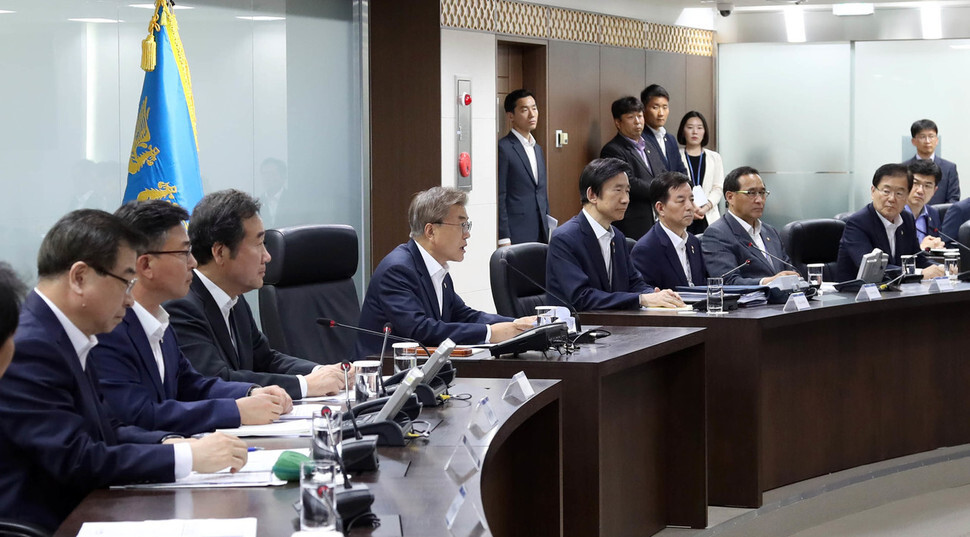hankyoreh
Links to other country sites 다른 나라 사이트 링크
Presiding over first National Security Council meeting, Moon condemns N. Korea’s provocations

“The only thing that North Korea has to gain from its provocations is international isolation and economic hardship, and it will lose its opportunity to develop. The South Korean government declares that it will neither compromise nor retreat a single step when it comes to national security and public safety,” President Moon Jae-in warned on June 8.
Blue House spokesperson Park Su-hyun said that Moon made these remarks during a plenary session of the National Security Council. While the standing committee of the National Security Council has met three times since Moon’s inauguration, chaired by the Blue House National Security Chief, this was the first time that a plenary session was held with Moon presiding. The council convened after North Korea launched what were believed to be surface-to-ship cruise missiles into the East Sea on the morning of June 8. North Korea’s missile launch came 10 days after it fired a Scud-class ballistic missile from Wonsan in Gangwon Province on May 29, and it was the fifth such launch since Moon took office.
Moon’s decision to call a plenary session of the National Security Council after being briefed on North Korea’s cruise missile launch seems to have been aimed at sending a stern warning to North Korea about its repeated missile provocations. While North Korea’s ballistic missile launches are a violation of UN Security Council resolutions, cruise missiles are not subject to sanctions. Furthermore, cruise missiles have jet engines, which enable them to fly low enough to avoid radar detection, but they are much less destructive than ballistic missiles, which have rocket engines that make a quick strike possible.
“Cruise missiles present a more direct threat to our safety than ballistic missiles [in terms of precision strikes],” Park said when asked why Moon had presided over a plenary session of the National Security Council even though North Korea had only launched cruise missiles. “On top of that, since the government has been a little perfunctory in its statements and responses each time this kind of thing happens, this meeting was also designed to facilitate serious and in-depth discussion of what our fundamental view of this should be.”
“The most important thing for us is to prevent North Korean provocations and to find a creative and fundamental solution to the North Korean nuclear issue,” Moon said, asking those present at the meeting to “come up with some good ideas for dismantling North Korea’s nuclear program.”
“If North Korea shows that it’s willing to denuclearize, we will take the lead in seeking support and cooperation from the international community,” Moon said, urging North Korea to change its attitude. He also reiterated his principle of “simultaneously pursuing sanctions and dialogue.”
“Starting at 6:18 am, North Korea began firing several projectiles that are presumed to be short-range surface-to-ship cruise missiles from the area of Wonsan in Gangwon Province in the direction of the East Sea,” said Noh Jae-cheon, public relations officer for South Korea's Joint Chiefs of Staff, during a briefing that morning. The Joint Chiefs of Staff estimated that the missiles flew for about 200 km at a maximum altitude of 2 km.
By Lee Jung-ae, staff reporter, and Park Byong-su, senior staff writer
Please direct questions or comments to [english@hani.co.kr]

Editorial・opinion
![[Column] Season 2 of special prosecutor probe may be coming to Korea soon [Column] Season 2 of special prosecutor probe may be coming to Korea soon](https://flexible.img.hani.co.kr/flexible/normal/500/300/imgdb/original/2024/0426/3317141030699447.jpg) [Column] Season 2 of special prosecutor probe may be coming to Korea soon
[Column] Season 2 of special prosecutor probe may be coming to Korea soon![[Column] Park Geun-hye déjà vu in Yoon Suk-yeol [Column] Park Geun-hye déjà vu in Yoon Suk-yeol](https://flexible.img.hani.co.kr/flexible/normal/500/300/imgdb/original/2024/0424/651713945113788.jpg) [Column] Park Geun-hye déjà vu in Yoon Suk-yeol
[Column] Park Geun-hye déjà vu in Yoon Suk-yeol- [Editorial] New weight of N. Korea’s nuclear threats makes dialogue all the more urgent
- [Guest essay] The real reason Korea’s new right wants to dub Rhee a founding father
- [Column] ‘Choson’: Is it time we start referring to N. Korea in its own terms?
- [Editorial] Japan’s rewriting of history with Korea has gone too far
- [Column] The president’s questionable capacity for dialogue
- [Column] Are chaebol firms just pizza pies for families to divvy up as they please?
- [Column] Has Korea, too, crossed the Rubicon on China?
- [Correspondent’s column] In Japan’s alliance with US, echoes of its past alliances with UK
Most viewed articles
- 1[Column] Season 2 of special prosecutor probe may be coming to Korea soon
- 2No good, very bad game for Korea puts it out of Olympics for first time since 1988
- 3‘We must say no’: Seoul defense chief on Korean, USFK involvement in hypothetical Taiwan crisis
- 4Division commander ordered troops to enter raging flood waters before Marine died, survivor says
- 5Is Japan about to snatch control of Line messenger from Korea’s Naver?
- 6Korea’s 1.3% growth in Q1 signals ‘textbook’ return to growth, says government
- 7Is N. Korea threatening to test nukes in response to possible new US-led sanctions body?
- 8[Editorial] Korea’s surprise Q1 growth requires objective assessment, not blind fanfare
- 9[Editorial] New weight of N. Korea’s nuclear threats makes dialogue all the more urgent
- 10[Editorial] In the year since the Sewol, our national community has drowned